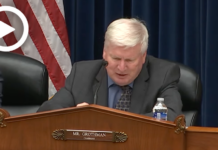Following reports of over 30 U.S. servicemembers suffering from traumatic brain injuries (TBIs) as a result of the Iranian-led strike on the Ain al-Asad air base in Iraq, U.S. Senator Joni Ernst (R-IA), a combat veteran, is pressing the Pentagon for answers.
In a letter to Under Secretary of Defense for Personnel and Readiness, Matthew P. Donovan, Ernst “seeks information on the security situation of our deployed forces who may be exposed to blast injuries in Iraq, and the plan of care to treat the injured servicemembers.”
In addition, Senator Ernst, chairman of the Senate Armed Services Subcommittee on Emerging Threats and Capabilities, “requests a briefing on the January 8 attacks and any associated issues related to the TBIs experienced by these servicemembers within 30 days of receiving this letter.”
The full letter can be read HERE.
Background:
Last year, for the second time, Senator Ernst partnered with Senator Elizabeth Warren (D-MA) on legislation that would improve research on TBI among servicemembers and strengthen the capacity to track and mitigate blast pressure exposure. The Blast Pressure Exposure Study Improvement Act builds on previous bipartisan legislation that the two senators introduced in 2018 that required the Department of Defense (DoD) to review and update its guidance on blast exposure during training, much of which was included in the FY19 National Defense Authorization Act (NDAA).
The Blast Pressure Exposure Study Improvement Act requires more frequent progress reports from DoD regarding the study of TBI and works to ensure we have the necessary information to better care for our servicemembers and help mitigate these types of injuries. Much of this bipartisan legislation was included in the FY20 NDAA.
















